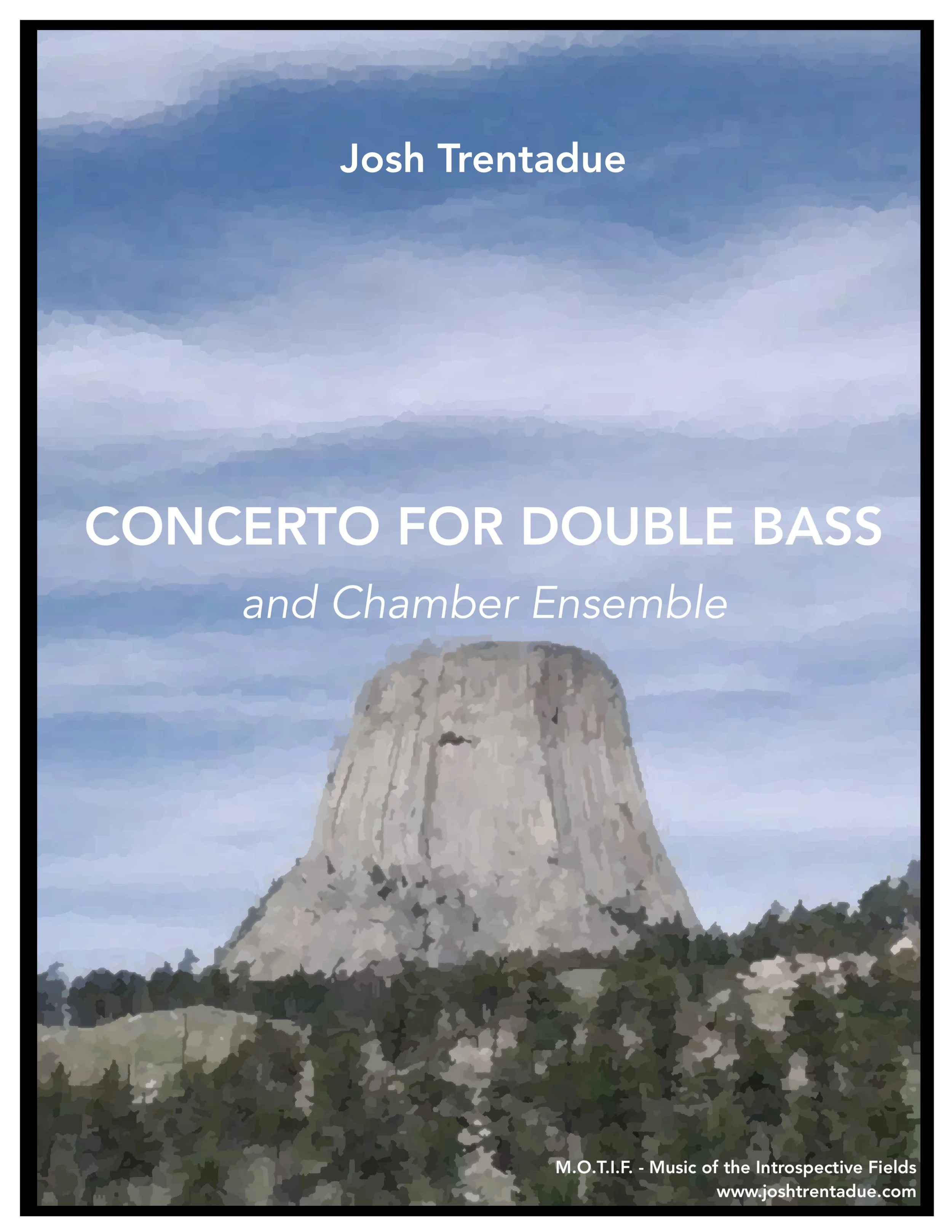ADVENTURES FOR DOUBLE BASS: AN INTERVIEW WITH COMPOSER JOSH TRENTADUE
On Saturday, March 17th, the world premiere of a brand-new work by composer Josh Trentadue will be taking place at the Michigan State University College of Music. Concerto for Double Bass features the virtuosity and wide artistic range of Matthew Gibson, a doctoral student at MSU who commissioned the piece and is also hosting the concert where the premiere will be taking place. Trentadue will be in attendance for the premiere, which will see the piano reduction of the concerto come to life.
We've had the opportunity to sit down and speak with him about this new concerto. Here is our full interview with him about this exciting new work:
Describe your inspiration for composing the piece.
The concerto was written for Matt Gibson, who is finishing up his doctoral degree at MSU. We were previously colleagues for a year while I was finishing up my Bachelor's Degree there. The idea to collaborate together on a new work came from a mutual love we shared for the diverse amount of repertoire for wind ensemble (an environment that's heavily influenced my musical background) as well as the vast richness of material for the solo double bass itself. What I particularly noticed about the latter was that the majority of all double bass concerti usually consisted or some kind of string ensemble or orchestra in accompaniment, for completely understandable reasons. That kind of homogenous sound existing between the bass's conversation with the rest of the strings allowed for some fantastic coloristic material extending from material between soloist and accompaniment in each respective concerto, but it ultimately wasn't a particular style I was yearning to explore in composing this new work.
When Matt commissioned me to write this piece for him, I requested that his part be the only true string player of the ensemble. The full version for double bass and chamber ensemble (which won't be played this week) consists of a 12-player accompaniment of only winds, brass, and percussion, including piano. An ensemble this unique presented to me a wide variety of opportunities in the soundscape that I thought would be interesting to explore in these conversations between bassist and ensemble, including the use of a special extended technique for bass that ultimately ended up in the final movement.
What is the overall conception for the piece (for example, is it programmatic or abstract? Is there a specific formal structure, color, or musical device you employed?)
The double bass concerto is an amalgamation of a great fascination I have with the American landscape, especially considering how diverse it all really is. We have the awesome canyons and mountains of the west with dry and arid landscapes, and if you go to the east, there's mostly beautiful cities and towns that pepper a landscape of hills and even more mountains, with coastal beaches on the shoreline and the like. You go up north, there's more opportunities to view the forests at all seasons and see something beautiful arise from that, and if you go down south, there's a completely different landscape altogether. This is all on just one portion of the continent! This rich amount of diversity in the landscape alone became the ultimate inspiration for the concerto.
The work is in four movements total and is essentially a road trip throughout portions of the American countryside. I imagined the bassist would be acting as a tourist throughout exploring each of these places, being the only string player in the ensemble, and that the instrument's musical reactions would be an extension of being immersed in each of these environments in some fashion. There's one major theme that's presented and transformed throughout while each movement has its own musical identity. The first movement starts off the journey in the mountains and canyons of the west, while the second movement visits some of the more prominent historical museums and monuments in areas such as Washington, D.C. The third movement is very light and fun in the style of a sea shanty intermixed with a familiar pre-existing folk tune, while the fourth movement is the most wild of the bunch as the bassist becomes immersed in the bustling city life.
What are some of the goals you strove to accomplish in writing the work?
Usually, my compositional process before even writing a single note is asking myself a few questions: What is this piece about? Where do I want it to go? Who is involved and what is involved in general? And, are there any particular sounds or stylistic things that would be beneficial to explore and appropriate for the nature of the piece? I may not have the answers to all of these questions immediately, but it is a place for me to start thinking about the music involved. I've also recently taken to sketching out some ideas on paper and playing through other music. Sometimes it's improvised and other times it's other music, like classical piano solos or chorales or even different songs/pop tunes if I feel like it. The sketches themselves aren't actually musical notes or anything like that, but various shapes and lines for where I feel the form of the piece will ultimately lead.
With this piece, my goals were twofold; firstly, creating a theme that was unique in and of itself which could be organically developed throughout the entire duration of the piece. The second goal was to create a soundscape in the entire ensemble that generated fluid reactions between soloist and accompaniment, with each group working off of each other with the material each of them was given. The uniqueness of the accompanying chamber ensemble presented me the opportunity to explore this second goal in greater detail.
What are some of the challenges you faced in writing the work?
With the bass being the only string instrument in the group, there are multiple cases where certain instruments in the chamber ensemble could overshadow some of the material in the bass, whether it be because of tone quality and color or the particular range of an instrument potentially clashing with the bass and vice versa. My orchestrational approach to this concerto was done very carefully to avoid these concerns as much as possible, especially in cases where the bassist is supposed to be featured more often. The use of a smaller ensemble definitely helped with this. A majority of the accompaniment where the bassist is featured was generally left very light and sparse with only a few players at a time. When the whole group plays together, the bassist becomes one with the ensemble.
The other challenge was creating a dialogue for the bassist that exemplified Matt's own extraordinary musicianship and also pushed it to uncharted territories. A lot of this came from taking the extended techniques the bass can accomplish and seeing how they could be evolved and transformed throughout this musical journey along with the rest of the given material.
Is there anything specific about your piece that you'd like your audience to look out for?
The third movement, in all of its jovial fun, partially contains an arrangement of an old traditional American folk song intermixed with the renditions of the sea shanty. If you come to the premiere, see if you can guess what it is!
What do you hope your audience ultimately take away in hearing your work?
This experience has been nothing but fruitful and rewarding in every step of the process, and I can definitely say that it's one of the pieces I've had the most fun writing. I hope that this sense of adventure and wonder that I've had the fortune of experiencing in my life is reflected well in this concerto, and I hope that it resonates with people in a way that brings a sense of joy and spirit to the concert hall.

